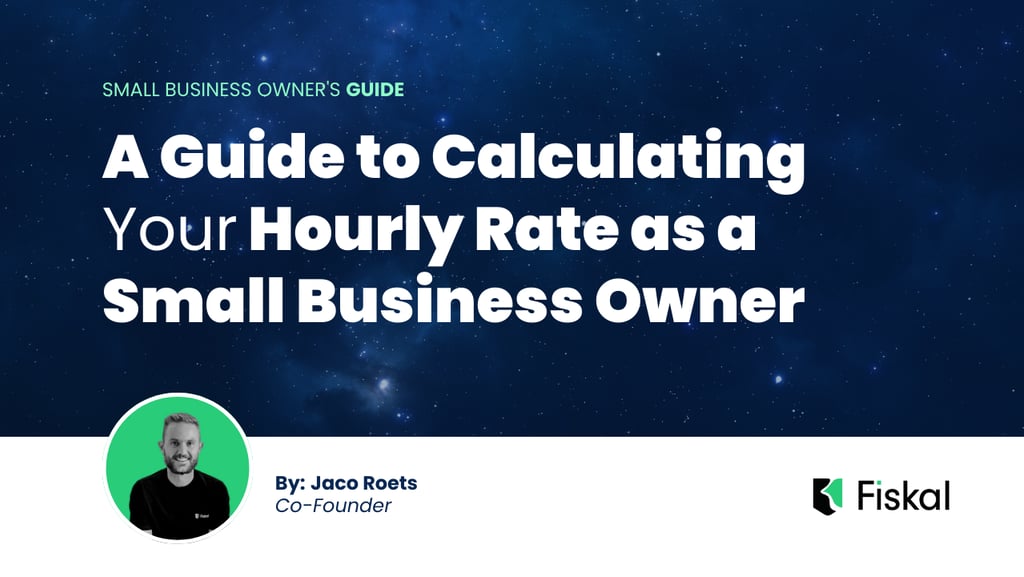How to Determine Your Worth: A Guide to Calculating Your Hourly Rate as a Small Business Owner
Are you a small business owner, eager to determine your worth and set your hourly rate? Look no further! In this comprehensive guide, we'll walk you through the process of calculating your ideal hourly rate, ensuring that you get paid what you deserve.
SYSTEMS AND SOFTWARE


As a business owner, it's crucial to accurately assess your value, considering factors such as your expertise, industry standards, and desired income. Understanding your worth not only helps you maximize your earnings but also establishes your credibility in the market.
By following the steps outlined in this guide, you'll gain the confidence to set your hourly rate confidently. We'll explore various considerations, including your business expenses, desired profits, and the market rate for your skills. Armed with this knowledge, you'll be equipped to negotiate fair compensation and attract clients who value your work.
Whether you're a freelancer, consultant, or service-based entrepreneur, this guide will empower you to take control of your financial future. So, let's dive in and uncover your true worth as a small business owner!
The importance of determining your worth as a small business owner
Determining your worth as a small business owner is essential for several reasons. Firstly, it ensures that you are adequately compensated for your time, effort, and expertise. Setting an appropriate hourly rate allows you to earn a fair income and maintain a sustainable business model.
Secondly, understanding your worth establishes your credibility in the market. Clients are more likely to value your services if they perceive that you have accurately assessed your value. This, in turn, can lead to more opportunities and higher-quality clients who are willing to pay a premium for your expertise.
Additionally, determining your worth enables you to make informed business decisions. By knowing your value, you can assess the profitability of different projects and opportunities. This knowledge empowers you to focus on high-value activities and avoid undercharging or overcommitting yourself.
Overall, calculating your hourly rate is a crucial step in running a successful business. It ensures that you are compensated fairly, establishes your credibility, and enables you to make strategic decisions that align with your financial goals.
Factors to consider when calculating your hourly rate
When calculating your hourly rate, it's important to consider several factors to ensure that you are setting a rate that reflects your value and aligns with your financial goals. Here are some key considerations to keep in mind:
Researching industry standards and competitors' rates
Researching industry standards and your competitors' rates is a valuable starting point in determining your worth. Understanding the average rates in your industry gives you a benchmark to compare your own rates against. It also provides insights into what clients are willing to pay for similar services.
Start by conducting online research and reaching out to professional networks to gather information about industry standards. Look for resources such as industry associations, freelance platforms, and pricing surveys. Analyze the rates charged by your competitors or businesses offering similar services. This research will give you a solid foundation for setting your hourly rate.
Evaluating your skills, experience, and expertise
Your skills, experience, and expertise play a significant role in determining your worth as a small business owner. Consider the unique value you bring to the table and how it differentiates you from your competitors. Assess your level of expertise, certifications, and any specialized knowledge that sets you apart.
Evaluate how your skills and experience contribute to solving your clients' problems or meeting their needs. The more value you can provide, the higher your hourly rate can be justified. Be honest with yourself about your strengths and weaknesses to accurately assess your market value.
Determining your desired income and financial goals
Determining your desired income and financial goals is crucial when setting your hourly rate. Consider your personal and business financial obligations, such as living expenses, taxes, savings, and reinvestment. Reflect on the income level you aspire to achieve and the lifestyle you want to maintain.
Calculating your desired income helps you understand how much you need to earn to cover your expenses and meet your financial goals. It also provides a reference point for evaluating the feasibility of your hourly rate. Remember to account for factors such as the number of billable hours you can realistically work and any non-billable time required for business administration or marketing activities.
Calculating your overhead costs
To accurately determine your hourly rate, it's important to calculate your overhead costs. Overhead costs include any expenses that are necessary for running your business but are not directly tied to a specific project or client. Examples of overhead costs may include rent, utilities, software subscriptions, insurance, and marketing expenses.
Calculate your monthly or annual overhead costs and divide them by the number of billable hours you anticipate working. This will give you an idea of how much you need to charge per hour to cover your business expenses. It's essential to include overhead costs in your hourly rate to ensure that you are operating a profitable business.
Adjusting your hourly rate based on market demand and value
While industry standards and competitors' rates provide a starting point, it's important to consider market demand and the unique value you offer when setting your hourly rate. If there is a high demand for your services and you offer specialized expertise, you may be able to command a higher rate than the average.
Consider the value your services provide to your clients and how it impacts their business or personal goals. If you can demonstrate a significant return on investment or offer a solution to a pressing problem, you can justify charging a premium rate. Assess the market demand for your services and adjust your hourly rate accordingly to reflect your value.
Tips for negotiating your rate with clients
Negotiating your rate with clients can sometimes be challenging, but with the right approach, you can effectively communicate your value and secure fair compensation. Here are some tips to help you navigate rate negotiations:
- Clearly communicate your value proposition
When discussing your rate with clients, it's crucial to clearly communicate your value proposition. Highlight the unique skills, expertise, and experience you bring to the table and how it benefits your clients. Explain how your services can solve their problems or help them achieve their goals.
By effectively conveying your value, you position yourself as an indispensable asset to your clients. This makes it easier to negotiate a rate that reflects your worth.
- Provide evidence of your past successes
Clients are more likely to agree to your rate if you can provide evidence of your past successes. Share case studies, testimonials, or examples of projects where you have delivered exceptional results. This helps build trust and confidence in your abilities, making it harder for clients to negotiate for a lower rate.
When discussing your rate, refer to specific examples where you have achieved significant outcomes for your clients. This evidence strengthens your negotiating position and justifies your desired rate.
- Be flexible but firm
Negotiations often involve some level of compromise. While it's important to be flexible during rate negotiations, it's equally important to be firm about the value you bring. Clearly communicate your bottom line and the minimum rate you are willing to accept.
If a potential client is unable to meet your desired rate, explore alternative options such as adjusting the scope of work or offering additional services. Remember, it's essential to find a balance between being accommodating and ensuring that you are adequately compensated for your time and expertise.
- Consider long-term partnerships
When negotiating rates, consider the potential for long-term partnerships with clients. Building long-term relationships can be mutually beneficial and provide stability for your business. If a client is unable to meet your desired rate initially, explore the possibility of adjusting the rate over time as the relationship develops and you prove your value.
By emphasizing the value of a long-term partnership, you can negotiate a fair rate that aligns with your worth and the client's budget.
Tracking and reviewing your hourly rate regularly
Setting your hourly rate is not a one-time task. It's important to track and review your rate regularly to ensure that it remains aligned with your worth and financial goals. Here are some strategies for tracking and reviewing your hourly rate:
- Monitor your profitability
Regularly monitor your profitability by tracking your revenue, expenses, and billable hours. Assess whether your hourly rate is generating the desired level of income and profitability for your business. If you find that your rate is not meeting your financial goals, consider adjusting it accordingly.
By regularly monitoring your profitability, you can make data-driven decisions about your rate and ensure that you are on track to achieve your financial objectives.
- Seek client feedback
Client feedback is a valuable source of information when evaluating your hourly rate. Ask your clients for feedback on the value they perceive in your services and whether they believe your rate is fair. Use this feedback to identify areas for improvement or validate your current rate.
By actively seeking client feedback, you demonstrate your commitment to providing exceptional value and staying responsive to their needs. This feedback can help you refine your rate and strengthen your client relationships.
- Stay updated on industry trends
The business landscape is constantly evolving, and it's important to stay updated on industry trends and changes in market rates. Subscribe to industry newsletters, follow thought leaders in your field, and participate in professional communities to stay informed.
By staying updated on industry trends, you can identify opportunities to adjust your rate based on market demand, emerging technologies, or changes in client expectations. This proactive approach ensures that your rate remains competitive and reflects the current market value of your services.
Conclusion: Embracing your worth as a small business owner
Determining your worth as a small business owner is an empowering process that enables you to take control of your financial future. By accurately assessing your value, considering factors such as industry standards, competitors' rates, your skills, experience, and desired income, you can confidently set your hourly rate.
Remember, determining your worth is not a one-time task. Regularly track and review your rate to ensure that it remains aligned with your financial goals and market value. Be proactive in negotiating your rate with clients, and consider the potential for long-term partnerships.
Embrace your worth as a small business owner and recognize the unique value you bring to the table. By setting your hourly rate appropriately, you can attract clients who value your work and ensure that you are compensated fairly for your time, expertise, and effort.
At Fiskal we understand that knowing your worth and taking charge of your financial needs is also important when starting a business. Take charge of your financial future and confidently determine your worth as a small business owner!












